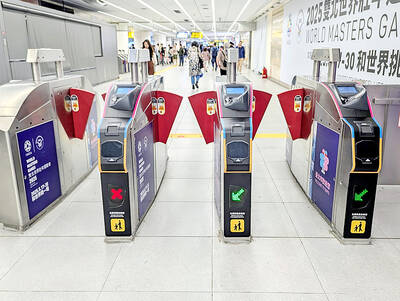The Council of Agriculture (COA) on Thursday announced a plan to work with veterinarians to ease import restrictions on animal drugs after a lawmaker’s comments about the issue triggered a public furor.
On Wednesday last week, Democratic Progressive Party Legislator Kao Chia-yu (高嘉瑜) asked COA Minister Chen Chi-chung (陳吉仲) to crack down on the use of unapproved veterinary drugs, citing a complaint from a voter who blamed chemotherapy drugs for the death of a pet.
Kao’s remarks drew a flood of criticism from animal lovers on social media who said that Taiwanese veterinarians routinely use gray-market drugs due to a dearth of legally imported products.

Photo: Lo Chi, Taipei Times
Agricultural officials have created a plan to address the shortage of veterinary drugs after officials heard complaints from the Taiwan Veterinary Medicine Association at a meeting organized by Kao, the council said in a news release.
In response to criticism over the rigidity and red tape involved in importing animal drugs, registered veterinary trade groups and clinics would be empowered to import and stockpile the medicines, it said.
In addition, importers would not be required to present paper photocopies of the drug’s sale permit issued by its country of origin or authorization documents from the original manufacturer, it said.
Importers would also receive waivers for certain requirements, including the presentation of a physical copy of a drug’s sales permit in its country of origin, among other restrictions deemed unnecessary, the council said.
The council and the Ministry of Health and Welfare are to conduct regular evaluations to approve the veterinary use of drugs designed for humans under a new regulation to be created under Article 4 of the Animal Protection Act (動物保護法), it said.
According to the act, regulations governing the use of human drugs on dogs, cats and animals not raised for economic value “shall be stipulated by the central competent authority in collaboration with the central health competent authority.”
This measure is necessary to avoid contraventions of the Pharmaceutical Affairs Act (藥事法), it said.
Chang Fang-chia (張芳嘉), dean of National Taiwan University’s School of Veterinarian Medicine, said the proposed easing of import restrictions would be a boon for Taiwanese veterinarians trying to obtain medicines.

A magnitude 6.4 earthquake struck off the coast of Hualien County in eastern Taiwan at 7pm yesterday, the Central Weather Administration (CWA) said. The epicenter of the temblor was at sea, about 69.9km south of Hualien County Hall, at a depth of 30.9km, it said. There were no immediate reports of damage resulting from the quake. The earthquake’s intensity, which gauges the actual effect of a temblor, was highest in Taitung County’s Changbin Township (長濱), where it measured 5 on Taiwan’s seven-tier intensity scale. The quake also measured an intensity of 4 in Hualien, Nantou, Chiayi, Yunlin, Changhua and Miaoli counties, as well as

Credit departments of farmers’ and fishers’ associations blocked a total of more than NT$180 million (US$6.01 million) from being lost to scams last year, National Police Agency (NPA) data showed. The Agricultural Finance Agency (AFA) said last week that staff of farmers’ and fishers’ associations’ credit departments are required to implement fraud prevention measures when they serve clients at the counter. They would ask clients about personal financial management activities whenever they suspect there might be a fraud situation, and would immediately report the incident to local authorities, which would send police officers to the site to help, it said. NPA data showed

ENERGY RESILIENCE: Although Alaska is open for investments, Taiwan is sourcing its gas from the Middle East, and the sea routes carry risks, Ho Cheng-hui said US government officials’ high-profile reception of a Taiwanese representative at the Alaska Sustainable Energy Conference indicated the emergence of an Indo-Pacific energy resilience alliance, an academic said. Presidential Office Secretary-General Pan Men-an (潘孟安) attended the conference in Alaska on Thursday last week at the invitation of the US government. Pan visited oil and gas facilities with senior US officials, including US Secretary of the Interior Doug Burgum, US Secretary of Energy Chris Wright, Alaska Governor Mike Dunleavy and US Senator Daniel Sullivan. Pan attending the conference on behalf of President William Lai (賴清德) shows a significant elevation in diplomatic representation,

The Taipei MRT is to begin accepting mobile payment services in the fall, Taipei Rapid Transit Corp said on Saturday. When the company finishes the installation of new payment units at ticketing gates in October, MRT passengers can use credit cards, Apple Pay, Google Pay and Samsung Pay, the operator said. In addition, the MRT would also provide QR payment codes — which would be compatible with Line Pay, Jkopay, iPass Money, PXPay Plus, EasyWallet, iCash Pay, Taiwan Pay and Taishin Pay — to access the railway system. Currently, passengers can access the Taipei MRT by buying a single-journey token or using EasyCard,